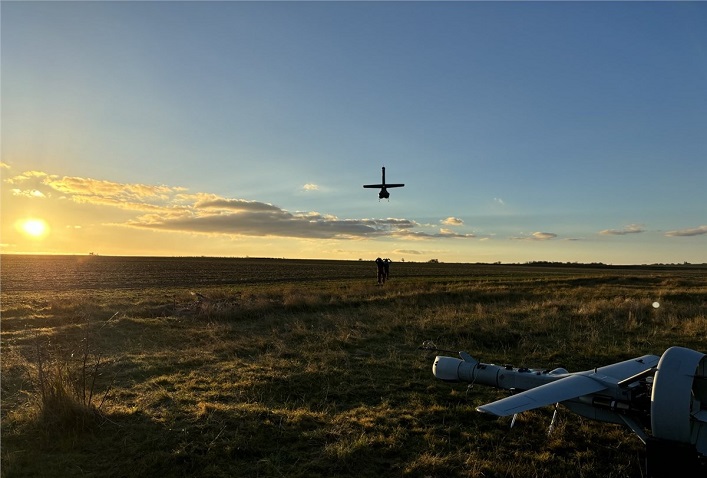IN FOCUS
Brave1 Cluster Accelerates Defense Tech Innovation With State Support and Grants
Ukraine’s Brave1 defense technology cluster has rapidly scaled up, supporting over 1,500 developers and enabling the deployment of more than 3,500 tech solutions to the battlefield, with 80% of front-line innovations now coming from cluster participants. Backed by substantial state grants and a new military tech marketplace, Brave1 is fueling investment and fast-tracking advanced systems like drones, robotics, and electronic warfare to meet urgent defense needs.
“We’re relaunching the BRAVE1 grant program. There’s a growing need for effective technologies on the frontlines, and to bring these innovations to life, companies need resources, Nataliia Kushnerska, CEO of BRAVE1, said in a LinkedIn post, noting the grants will range from from $12,000 to $192,000.
Ukrainian Startup Seeks $5M to Launch Nation’s First Eco-Friendly Battery Factory
SorbiForce, a Ukrainian startup specializing in sustainable energy storage, is seeking $5 million to build the country’s first ecological battery production facility. The company’s innovative batteries, made from carbon, water, and salt, boast a 30-year lifespan and are almost entirely biodegradable, offering a safer and greener alternative to lithium-ion technology as demand for sustainable solutions accelerates.
The technology, developed by CEO and co-founder Serhii Kaminskyi and his team, utilizes agricultural waste to create non-flammable, non-toxic batteries that can endure up to 6,000 charge cycles. With 95% of each battery cell decomposable into organic materials and the remainder reusable, SorbiForce’s closed-loop approach addresses both environmental and safety concerns posed by traditional batteries.
Poland Debuts Eastern Europe’s First Superconducting Quantum Computer
Poland has taken a significant leap in quantum technology with the installation of its first superconducting quantum computer at Wrocław University of Science and Technology, delivered by Finnish-German startup IQM Quantum Computers. The 5-qubit system, named IQM Spark, is set to become operational in the second quarter of 2025 and will be accessible not only to university researchers and faculty but also to students, offering unprecedented hands-on experience with real quantum hardware in Central and Eastern Europe. This development addresses a critical infrastructure gap, as most universities in the region have relied on simulations or limited cloud access, and positions Poland as an emerging hub for quantum research and talent development. [Source: Vestbee]
UKRAINE
Ukraine Deploys UNEX UGV, an Amphibious Robotic Vehicle for Modern Warfare
Ukraine’s Ministry of Defence has announced the operational deployment of the UNEX UGV, a next-generation amphibious unmanned ground vehicle developed by UGVR Machinery in partnership with Czech innovators. The UNEX UGV features a unique chassis with ultra-low-pressure tires and patented pneumatic suspension, enabling it to traverse water, swamps, rubble, and even ice, while exerting less ground pressure than a human footstep-allowing it to evade anti-tank mines. [Source: TechUkraine]
Ukrainian IT Sector Grapples With Unprecedented Challenges Amid Ongoing Turmoil
Ukraine’s IT industry, once a regional growth engine, is now contending with its most severe challenges in years as the war continues to disrupt operations, talent mobility, and client confidence. Companies face mounting pressures from security risks, infrastructure instability, and a shifting global market, forcing many to adapt business models, accelerate digital transformation, and seek new international partnerships to sustain growth and resilience in an uncertain environment. [Source: Ukraine Business News]
Europe Shifts Strategy to Boost Ukrainian Defense Industry Over Direct Arms Supplies
Europe plans to increase investment in the Ukrainian defense industry instead of supplying arms directly, aiming to strengthen Ukraine’s domestic production capabilities and long-term self-sufficiency in defense manufacturing. This strategic shift focuses on building local capacity to support Ukraine’s ongoing security needs amid prolonged conflict. [Source: Ukraine Business News]
Private Investment in Defense Tech Surges 900% in One Year but Funding Gap Persists
Private investment in Ukraine’s defense technology sector has skyrocketed by 900% over the past year, reflecting growing confidence in the country’s innovative military capabilities. Despite this dramatic increase, experts warn that overall capital remains insufficient to meet the expanding needs of Ukraine’s defense industry amid ongoing conflict and rapid technological development. [Source: Ukraine Business News]
Ukrainian startup NORDA Dynamics has secured $150,000 in funding from Angel One Fund to accelerate the development and scaling of its autonomous UAV control technologies tailored for electronic warfare and contested communication environments. Founded in 2023, the company specializes in systems that enable drones to perform complex, high-precision missions autonomously, with flagship products like Underdog for last-mile targeting and StableLink for maintaining drone stability in dynamic combat scenarios. [Source: Vestbee]
LATVIA
Latvia Leads the World in Workplace ChatGPT Usage
A recent study reveals that Latvia has the highest rate of ChatGPT adoption at work globally, with nearly 60% of employees using the AI tool in their professional activities. This widespread integration spans various industries, highlighting Latvia’s rapid embrace of AI technologies to boost productivity, creativity, and problem-solving in the workplace. [Source: Labs of Latvia]
Investment Volumes in Latvia Hit EUR 144 Million in Q1 2025
Latvia’s investment market saw robust activity in the first quarter of 2025, with total investment volumes reaching EUR 144 million. This strong performance reflects growing investor confidence and continued interest across key sectors, signaling a positive outlook for Latvia’s economic development and business environment. [Source: Labs of Latvia]
Demand for ICT Specialists Remains Robust Across the Baltic States
The Baltic region continues to experience strong and growing demand for ICT specialists, driven by accelerated digital transformation and expanding tech industries in Latvia, Lithuania and Estonia. Key areas of need include software development, cybersecurity, data analysis, cloud engineering, and AI/machine learning. Lithuania alone anticipates a 91% increase in ICT specialist demand by 2025, requiring over 7,600 new professionals to support a booming startup ecosystem and fintech sector. [Source: Labs of Latvia]
KAZAKHSTAN
inDrive Founder Arsen Tomsky on Overcoming Injustice and IPO Plans
Arsen Tomsky, founder of international ride-sharing company inDrive, shared his personal journey and business philosophy at a recent forum, emphasizing how overcoming adversity-from a harsh childhood in Yakutsk to personal struggles. He recounted the origins of inDrive as a response to unfair taxi price hikes, highlighting the company’s mission to fight injustice by keeping commissions low and empowering users. Tomsky confirmed inDrive’s plans to go public within five years, aiming for a dual Kazakh-American identity with the U.S. IPO. He also addressed the issues of gender and age in business, arguing for equal opportunities and citing examples of older women excelling in education and entrepreneurship. [Source: DigitalBusiness.kz]
ESTONIA
Estonian Transportation Tech Startup Ridango Acquires Irish Transit Data Firm uTrack
Estonian company Ridango, known for its automated fare collection and mobility-as-a-service (MaaS) technology serving over 150 clients in 25+ countries, has acquired Dublin-based uTrack, a real-time public transportation data platform provider with clients across Ireland, the UK, and North America. The acquisition comes as Ridango, backed by London-based private equity firm Bregal Milestone since March, aims to accelerate growth and expand its global footprint in transportation technology. [Source: BalticVC]
Bolt Launches Business Accelerator in Estonia to Support Food Delivery Entrepreneurs
Tallinn-based unicorn Bolt has introduced a new business accelerator in Estonia focused on empowering food delivery managers and drivers to develop and launch their own business ideas. Partnering with consulting firm Civitta, the program offers participants mentorship, skills training, and seed capital to help turn concepts into viable ventures. This initiative builds on Bolt’s previous accelerator programs in Africa and aligns with its broader mission to foster entrepreneurship within its ecosystem. [Source: BalticVC]
Estonian company GScan raises €2.8 million for infrastructure scanning technology
GScan, an Estonian startup specializing in scanning and tomography solutions for assessing the structural integrity of critical infrastructure like tunnels and bridges, has secured €2.8 million in new funding. Key investors include Estonian Ivard OÜ, led by Peeter Mand, who contributed nearly €1 million, and GScan CEO Marek Helm, who invested €300,000. Founded in 2018, GScan collaborates with major partners such as UK National Highways and firms like AtkinsRealis andJacobs, with its technology also applicable in defense, healthcare, national security, and space sectors. The company recently initiated a project using muon tomography to detect contraband in shipping containers, highlighting its innovative approach to non-invasive inspection. [Source: BalticVC]
LITHUANIA
Lithuania Emerges as the Largest Fintech Hub in the EU with 282 Licensed Companies
Lithuania has solidified its position as the largest fintech hub in the European Union by the number of licensed fintech companies, reaching 282 in 2025-a 2% increase from the previous year. The country’s fintech workforce also grew by 5.4% to 7,800 professionals. Serving over 300 million EU customers, Lithuania ranks ninth in the EU for low money laundering and terrorist financing risks, making it an attractive destination for fintech firms, particularly in blockchain and cryptocurrency sectors, which now represent 15% of the local ecosystem. Foreign ownership is significant, with nearly half of fintech companies owned by investors primarily from the UK and the US, and 73% of surveyed firms citing Lithuania as their gateway to the EU market. [Source: BalticVC]
Lithuanian Edtech Startup BBright Joins Google’s Grow AI Accelerator
Lithuanian education startup BBright, founded in 2020 in Vilnius, has been selected to participate in Google.org’s Grow AI Accelerator program. BBright develops Elicėjus, a personalized, gamified learning platform for high school students that identifies learning gaps and recommends tailored lessons. The accelerator supports innovative AI/ML projects aligned with the UN Sustainable Development Goals, providing BBright and nine other startups with expert guidance and $250,000 each to advance their technology, business development, and impact strategies. Previously, BBright raised €200,000 from local investors including the Jaunaragiai fund and prominent business angels. [Source: BalticVC]






Add comment